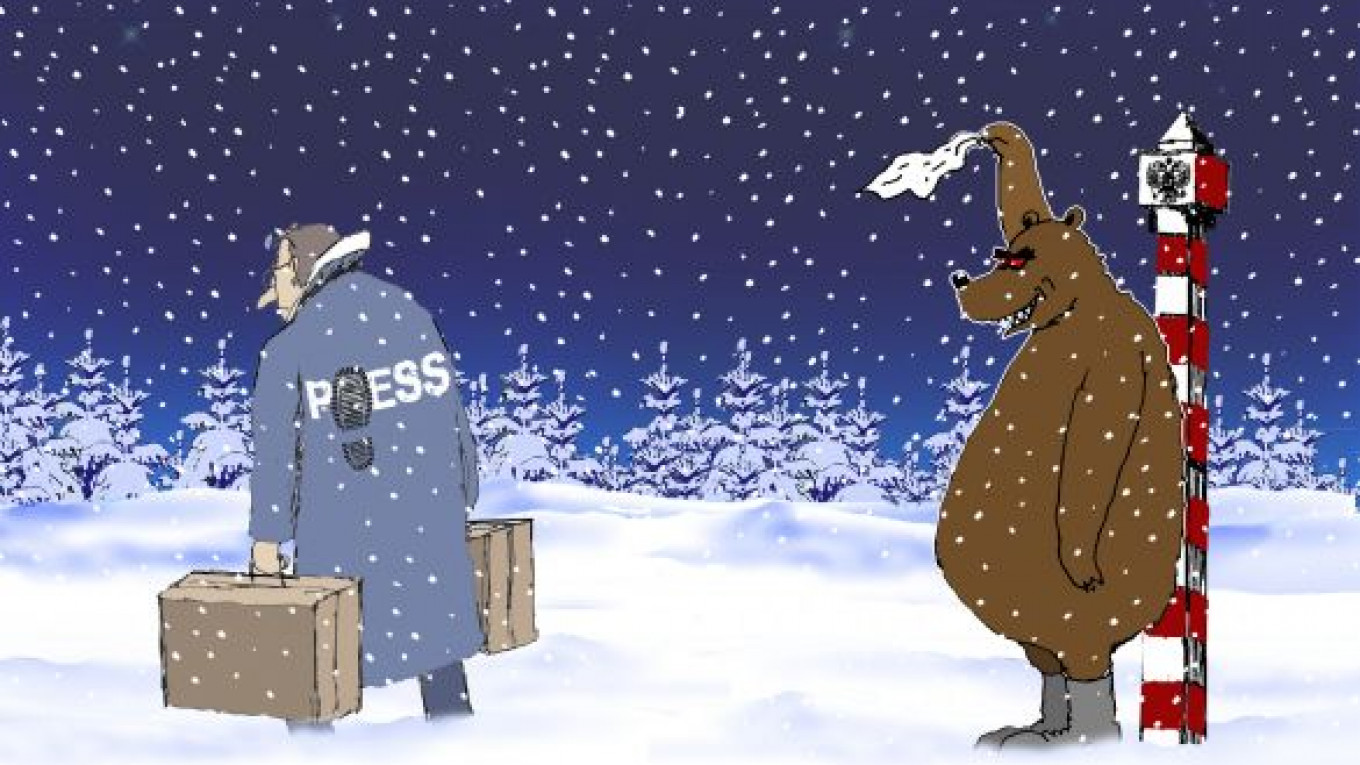David Satter is a familiar figure to anyone who follows events in Russia. A scholar and journalist, Satter has been writing about Russia since the mid-1970s, when he was Moscow correspondent for The Financial Times.
In those Cold War years, Satter differed from many of his colleagues in the foreign press corps who had few contacts, were isolated from everyday life and produced articles based on rewrites of Tass official reports. Satter met with Soviet dissidents and traveled to parts of the country that no other Western correspondent had ever visited. The KGB agents assigned to follow him had to hustle to keep up.
Considering that Satter has been an outspoken critic of the Kremlin since the 1970s, it was amazing that it took so long for Russian authorities to declare his presence on Russian territory "undesirable."
Therefore, in certain respects it was amazing that it took so long for Russian authorities to declare Satter's presence on Russian territory "undesirable." He readily admits to being critical of the Putin regime. "But there is actually quite a lot to criticize, so if you're going to report honestly from Russia you almost have to be critical," he said in an interview to CNN.
The Kremlin couldn't have liked his publications in support of the U.S. Magnitsky Act. Journalist Vladimir Abarinov, who wrote about Satter on his Facebook page, thinks that support alone was enough for the Kremlin to blacklist Satter.
The Kremlin must have liked even less Satter's doubts about the official version of the Moscow apartment house bombings of 1999, which played a significant role in raising then-Prime Minister Putin's rating before he ran for president the first time. The official version blames Chechen separatists, but in his book "Darkness at Dawn: The Rise of the Russian Criminal State," Satter presents evidence to suggest that the Federal Security Service was involved. And as the 2006 death by poisoning of former FSB agent Alexander Litvinenko in London showed, poking your nose too far into an investigation as to who was truly responsible for those bombings might lead to consequences far more serious than a visa refusal.
Finally, Satter must have hit a sore spot in the Kremlin when he wrote in December for CNN that visitors to the upcoming Winter Olympics in the Black Sea city of Sochi "are walking into what effectively is a war zone." This point of view may have been the reason that Dutch journalists Rob Hornstra and Arnold Van Bruggen were denied their visas in October.
Although Satter isn't the first foreign journalist to be refused a visa in the post-Soviet period, he is the first U.S. journalist to have this dubious honor. The last time this happened was in 1986, when U.S. News & World Report journalist Nicholas Daniloff was accused of espionage. He was arrested in Moscow and exchanged for a Soviet spy in the U.S.
Daniloff's expulsion marked a new low point in U.S.-Soviet relations and set off the largest spy scandal in the two countries' history. In the end, the U.S. expelled 100 Soviet diplomats suspected of spying, and the Soviets deported 10 U.S. diplomats and withdrew all 260 of the Russian support staff working for the U.S. Embassy in Moscow.
And now Satter's visa refusal marks another nadir in U.S.-Russia relations after the Soviet collapse. It comes at a time when a massive anti-American campaign is going on in Russia. Hardly a week goes by without state television broadcasting yet another sensational report about the latest U.S. conspiracy against Russia. One of the national channels is about to air a series in which the Chernobyl disaster is shown to have been orchestrated by CIA agents. The level of hostility in the official rhetoric of the Kremlin sometimes surpasses that of the worst days of the Cold War.
Russia continues to be the main sponsor of Syrian President Bashar Assad and his brutal civil war in which more than 3,000 people are killed every week. Last week, there were rumors that the Kremlin would sign an agreement with Iran to trade Iranian oil for Russian goods. This deal is a direct violation of the conditions of the agreement signed by six world powers and Iran in November. Meanwhile, Russia's defense budget is growing astronomically — 60 percent over the next three years. Special attention is being given to producing new weapons systems that could only be used in a huge war against NATO or the U.S.
All this has led journalist Nikolai Svanidze to the conclusion that Satter's visa refusal wasn't just a personal matter but rather an unfriendly signal to Washington. In an interview with Voice of America, Svanidze noted that "this is within the general trend in relations between Russia and the U.S. and the general atmosphere in Russia, where there is hostility to everything that comes from the West."
Unfortunately, the U.S. and the West do not have any options for responding to Moscow's latest challenge. A tit-for-tat annulment of a Russian journalist's visa to the U.S. would be playing by the Kremlin's rules, and only the correspondent and his readers would suffer. The flawed reset policy has left the U.S. without strong cards that could be played to stop the escalation of hostility coming from Moscow.
It's time for Western countries to redesign their policy toward Russia if we are to avoid seeing a remake of the Cold War.
Victor Davidoff is a Moscow-based writer and journalist who follows the Russian blogosphere in his biweekly column.
A Message from The Moscow Times:
Dear readers,
We are facing unprecedented challenges. Russia's Prosecutor General's Office has designated The Moscow Times as an "undesirable" organization, criminalizing our work and putting our staff at risk of prosecution. This follows our earlier unjust labeling as a "foreign agent."
These actions are direct attempts to silence independent journalism in Russia. The authorities claim our work "discredits the decisions of the Russian leadership." We see things differently: we strive to provide accurate, unbiased reporting on Russia.
We, the journalists of The Moscow Times, refuse to be silenced. But to continue our work, we need your help.
Your support, no matter how small, makes a world of difference. If you can, please support us monthly starting from just $2. It's quick to set up, and every contribution makes a significant impact.
By supporting The Moscow Times, you're defending open, independent journalism in the face of repression. Thank you for standing with us.
Remind me later.








